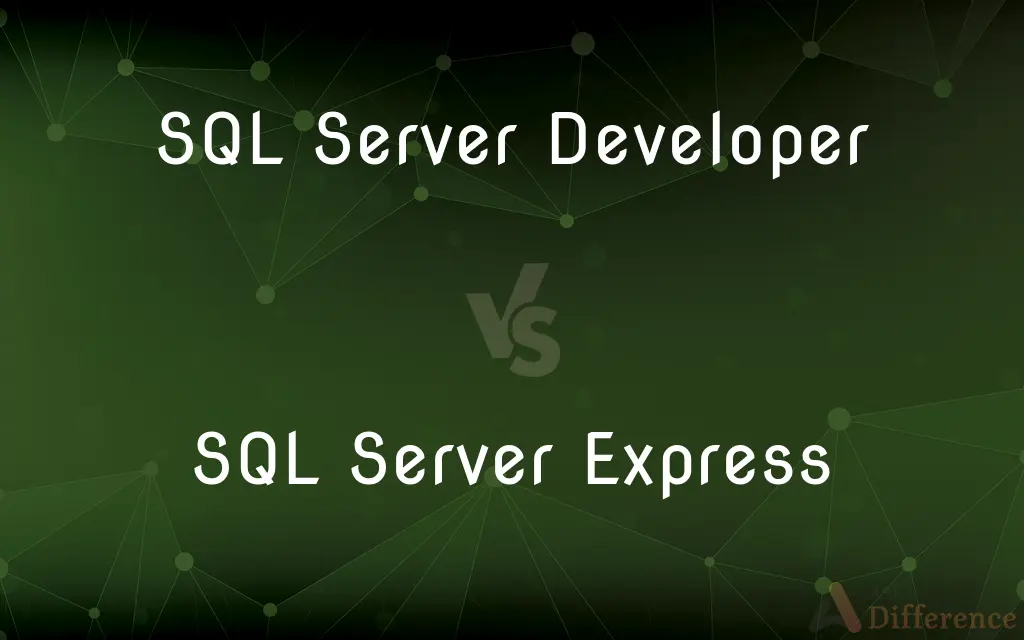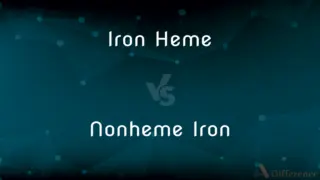SQL Server Developer vs. SQL Server Express — What's the Difference?
By Tayyaba Rehman — Published on December 25, 2023
SQL Server Developer offers full SQL Server capabilities for development purposes, while SQL Server Express is a free, limited version tailored for small-scale applications and databases.

Difference Between SQL Server Developer and SQL Server Express
Table of Contents
ADVERTISEMENT
Key Differences
SQL Server Developer provides developers with a platform that mirrors the full capabilities of SQL Server Enterprise Edition, but solely for development and test environments. On the other hand, SQL Server Express is designed to cater to lightweight databases and applications, often being used in small businesses or desktop applications.
One significant advantage of SQL Server Developer is that it allows developers to use and test all the features available in the Enterprise Edition without incurring costs. Conversely, SQL Server Express, while free, comes with limitations in terms of database size, performance tuning options, and advanced features.
SQL Server Developer is an excellent choice for those looking to develop and test robust applications without any restrictions before deploying them. SQL Server Express, because of its limitations, might not be suitable for large-scale or performance-intensive applications but works perfectly for simpler databases and lightweight apps.
It's essential to remember that while SQL Server Developer offers extensive capabilities, it isn't licensed for production use. SQL Server Express, although less powerful, can be used in both development and production scenarios given its capacity and feature constraints.
In summary, SQL Server Developer is the go-to for development environments that require the full power of SQL Server, whereas SQL Server Express is best for simpler applications or when budget constraints prevent purchasing a full SQL Server license.
ADVERTISEMENT
Comparison Chart
Purpose
Development and testing
Lightweight applications and databases
Licensing Cost
Free for development/testing
Free
Feature Set
Full features of Enterprise Edition
Limited features
Database Size Limitation
No limitation
Limited to 10 GB
Production Use
Not licensed for production
Licensed for both development and production
Compare with Definitions
SQL Server Developer
SQL Server Developer is a full-featured SQL Server edition for development purposes.
For extensive testing, our team uses SQL Server Developer.
SQL Server Express
Comes with limitations in size and advanced features.
We're aware that SQL Server Express limits our database to 10 GB.
SQL Server Developer
Ideal for comprehensive application development and testing.
For rigorous application testing, SQL Server Developer is our primary choice.
SQL Server Express
Suitable for both development and smaller-scale production scenarios.
For our compact e-commerce site, SQL Server Express is efficient.
SQL Server Developer
SQL Server Developer is not licensed for production deployment.
While we develop on SQL Server Developer, we deploy on the production-licensed version.
SQL Server Express
SQL Server Express is a free, scaled-down version of SQL Server.
For our startup's small database, we opted for SQL Server Express.
SQL Server Developer
It mirrors the capabilities of SQL Server Enterprise Edition.
SQL Server Developer allows us to experiment with all enterprise-level features.
SQL Server Express
Designed to be budget-friendly without requiring license costs.
We saved on initial costs by choosing SQL Server Express for our project.
SQL Server Developer
Offers unrestricted access to SQL Server features.
SQL Server Developer ensures no feature limitation during our development process.
SQL Server Express
Tailored for lightweight applications and databases.
SQL Server Express suffices for our desktop application's backend.
Common Curiosities
What's the maximum database size for SQL Server Express?
SQL Server Express databases are limited to 10 GB in size.
Is SQL Server Express free?
Yes, SQL Server Express is a free edition of SQL Server with some limitations.
Do both editions support stored procedures and views?
Yes, both SQL Server Developer and SQL Server Express support stored procedures and views.
What's the main purpose of SQL Server Developer?
SQL Server Developer is designed for development and testing with full SQL Server capabilities.
Do both editions support the same query language?
Yes, both use T-SQL, SQL Server's query language.
Is there a cloud version of SQL Server Developer or Express?
SQL Server is available in Azure as Azure SQL Database, but specific Developer and Express cloud versions per se don't exist.
Is SQL Server Developer identical to the Enterprise Edition?
In terms of features, yes, but it's not licensed for production.
Which edition is suitable for learning SQL Server basics?
Both can be used, but SQL Server Express is often chosen due to its simplicity and cost.
Can I use SQL Server Developer in a production environment?
No, SQL Server Developer isn't licensed for production use.
Are there performance differences between the two?
SQL Server Developer offers better performance tuning options compared to the limited SQL Server Express.
How often does Microsoft release updates for these editions?
Updates are frequent, but it's best to check Microsoft's official channels for exact details.
Can I upgrade from SQL Server Express to a more powerful edition?
Yes, you can upgrade from SQL Server Express to other editions as your needs grow.
Can I use SQL Server Express for a web application's backend?
Yes, but it's best for smaller web applications due to its limitations.
Which edition is recommended for small businesses?
SQL Server Express is usually recommended for small businesses due to its cost-effectiveness and simplicity.
Are there any restrictions on the number of connections in SQL Server Developer?
No, SQL Server Developer doesn't have such restrictions, unlike SQL Server Express.
Share Your Discovery

Previous Comparison
Baseball Gloves vs. Softball Gloves
Next Comparison
Iron Heme vs. Nonheme IronAuthor Spotlight
Written by
Tayyaba RehmanTayyaba Rehman is a distinguished writer, currently serving as a primary contributor to askdifference.com. As a researcher in semantics and etymology, Tayyaba's passion for the complexity of languages and their distinctions has found a perfect home on the platform. Tayyaba delves into the intricacies of language, distinguishing between commonly confused words and phrases, thereby providing clarity for readers worldwide.














































